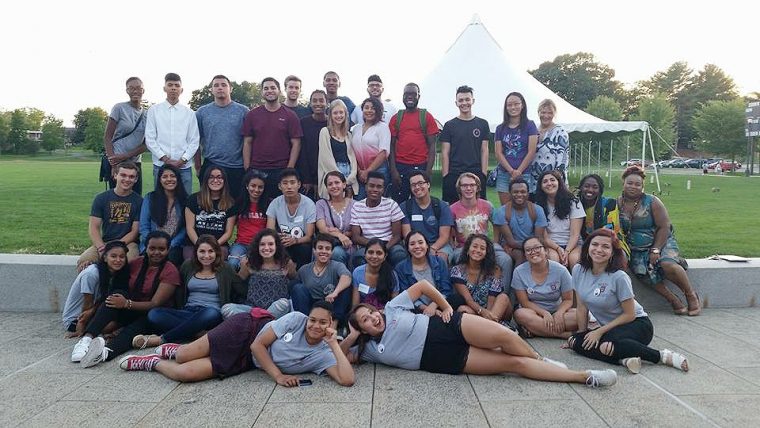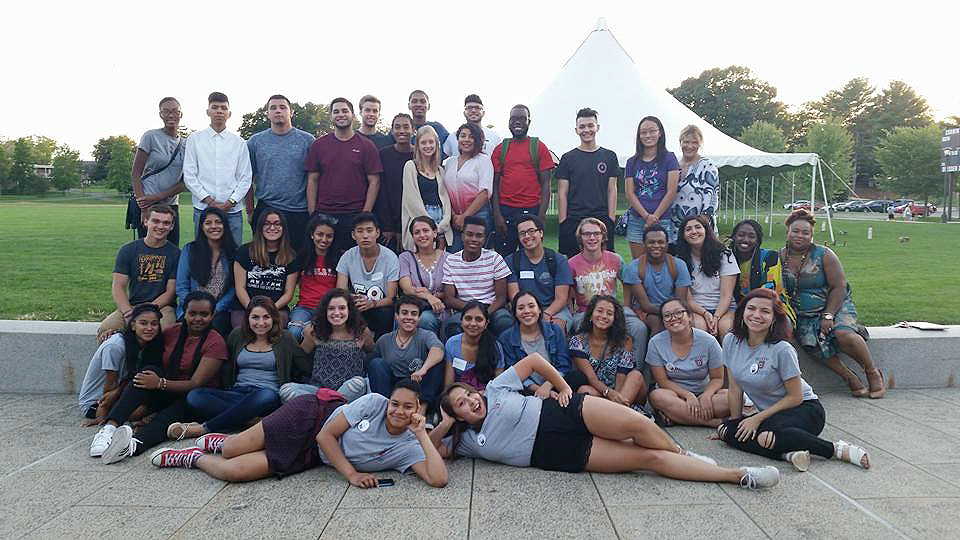First Things First Introduces First-Generation Students to Wesleyan, Each Other


As a first-generation college student from Scottsdale, Ariz., Caroline Liu ’18 is always aware of the many “nuanced and small ways in which my life experience differs from my peers.” These differences can be especially visible and discouraging during high-stress moments in the semester.
For example, she said, students often talk about having their parents read over their school work.
“As a first-generation American and low-income student, I don’t have the privilege to discuss any of my academics with my parents, much less have them check over my more theoretical work. They neither have the English language capacity nor the time, between working multiple jobs, for me to even consider them as a resource in that way,” said Liu, who is double majoring in computer science and feminist, gender and sexuality studies. While searching for internships and jobs, Liu is also not able to rely on her parents for assistance with reviewing resumes and cover letters, and providing references and connections to job opportunities.
“It means I need to get more creative with using the resources available on campus in a way that other students might not have to,” she said. “I’m incredibly fortunate for the mentors I’ve been able to find.”
Approximately 120 members of each class at Wesleyan, or 15 percent of the class, are first-generation college students. Based on feedback from many first-generation students about the challenges they face adapting to college life, in fall 2016 Wesleyan piloted First Things First, a pre-orientation program, with about 30 students. Sponsored by the Office of Student Affairs, Office for Equity and Inclusion, and the President’s Office, it is a student-driven initiative, designed to familiarize first-generation students with the college experience and the Wesleyan community. Participants are connected with other new first-generation college students, orientation leaders—older first-generation students—and faculty and staff mentors.
“Much of the program is based on this constructive concept of older students asking themselves, ‘What do I wish I had, and how can I make sure incoming students do?’” said Liu, who served as an orientation leader. Older first-generations had a hand in naming the program as well.
“Any first-year student at Wesleyan must adapt to the culture, the acronyms, and so many other things, but first-generation students have the challenge of acclimating to college without the benefit of parents who have gone through this experience before,” explained Jen Wood, dean for the Class of 2019, who designed and led the pilot in its first year. “In many ways, it can be a culture shock coming to Wesleyan. With this program, we aim to build on the strengths of these students—particularly, resilience and hard work—and also build a support structure around them.”
The program featured a dinner with university leaders, and two days of workshops on topics including study strategies, mindfulness, how to navigate financial aid paperwork and find work-study positions, how to engage effectively with professors, and more. It also included a “speed dating” session for the students to meet with different groups on campus, such as Religious and Spiritual Life, Study Abroad, Student Activities, and Counseling and Psychological Services (CAPS). Participants attended a social event with international students, whose orientation ran concurrently, and meals with different deans.
Perhaps most importantly, said Wood, was developing a cohort of students “to support one another, give a sense of belonging, and develop along with each other.”
In its first year, the program received much positive feedback from students.
Jo Jo Diaz ’20, a first-generation college student who grew up in New York City, said that while she wasn’t exactly worried or anxious about attending college, “I knew I’d have a harder lot than most. I knew I wouldn’t be able to ask my mother about balancing work schedules and academics and sports schedules, and I knew I couldn’t depend on her for money. Being able to navigate that on my own was difficult throughout the first few months of freshman year.”
What stuck with her most about First Things First was the sense of community.
“If I forgot everything else that the facilitators explained to us during specific meetings, I still remember and know that I have a very strong group of people who have either been through or are currently going through similar experiences,” she said. “It’s comforting to know that I can reach out to those people for affirmation, solidarity and help. […] The types of relationships you form within FTF are probably among the most valuable ones you’ll make at Wes.”
Rick Culliton, assistant vice president/dean of students, served as a mentor for students in the program. He makes sure his student mentees know where he is and how to reach him with questions. He meets with them a few times at the beginning of the school year to get to know them and share a bit about himself, then follows their lead as to how often they want to meet going forward.
This fall, the program was led by Dean for Equity and Inclusion Teshia Levy-Grant. In response to student feedback, she lightened the schedule of formal sessions a bit to allow the students more time to get to know one another.
“That’s the biggest part of this program: we connect FTF students, so they can share resources and just be in community with each other and talk about their shared experiences,” said Levy-Grant.
This year, the peer advisors were an instrumental part of the Orientation. They instituted drop-in hours in which new students can ask follow-up questions as the school year progresses. Levy-Grant plans to bring the group back together periodically to address any specific challenges, and to host activities over university breaks, when many first-generation students cannot afford to travel home.
She said sometimes students just need to hear validation that they belong at Wesleyan.
“It’s easy to feel like, ‘I don’t really belong here.’ And ask questions like: ‘Did I make a mistake? Do they understand that I come from an under-resourced school and I’m low income; and that this experience is really difficult for me?”
The program is expected to continue in future years under the auspices of the new Resource Center and Director Demetrius J. Colvin.

